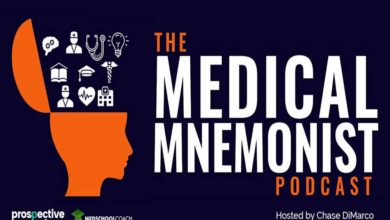Ryan Orwig from STATmed Learning explains education theories regarding mind maps and organizing your study structure.
In this episode Ryan Orwig from STATmed Learning (The STATmed Program) explains education theories regarding mind maps and organizing your study structure. He explains how to use Minimally Effective Links for creating Memory Palaces, and why Yoda may not have been the best instructor in the galaxy after all.
1:44 Continuing from Part 1: Using Spaced Repetition, Retrieval Practice, and Time Management
3:58 Theory on Mind Maps and Concept Maps for Study Organization and Structure
8:58 Memory Palace Examples for Medical Students
13:28 Using the Minimally Effective Link (MEL) for Medical Memory Palaces & Self Check Records
17:28 Using Retrieval Practice for your Memory Palaces (4x in 48 Hours)
19:41 Sound-Based Links (SBL), Association-Based Links (ABL) & Prescribed Links (PL) for Visual Mapping
22:58 Mistakes in Linking Terms within Memory Palaces & Weak Dynamic Visual Mnemonics
35:18 Using “Crude” Visual Mnemonics and Documenting Your Visuals: Medical Student Testimonials
38:20 Yoda and Retrieval Practice: A New Debate
Learn more about STATMed Learning and The STATProgram. Find more content on STATMed Learning’s YouTube page.
You can also contact STATMed through emailing Ryan, or call/text (304) 654-6503. Learn more, ask questions, share your story, and see if STATMed can help you.
